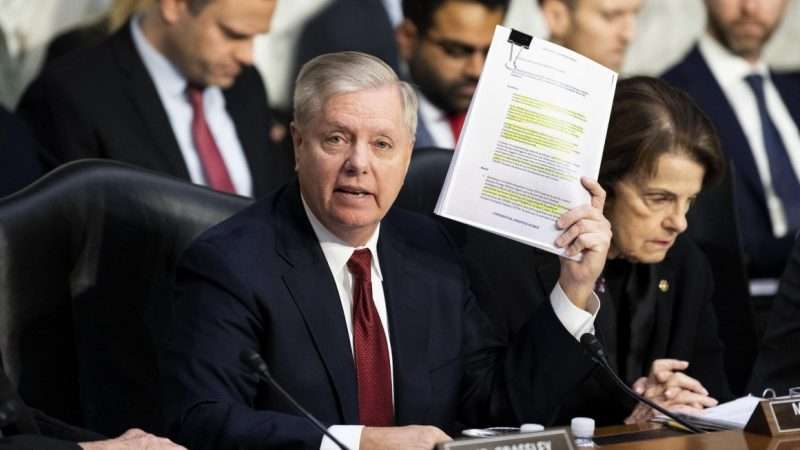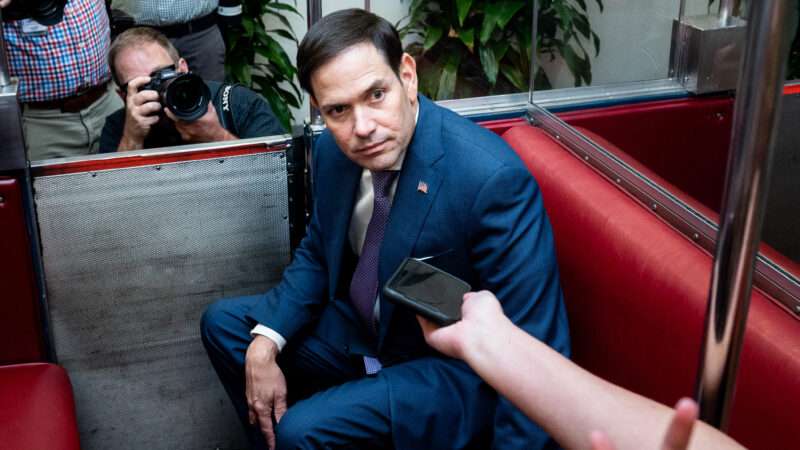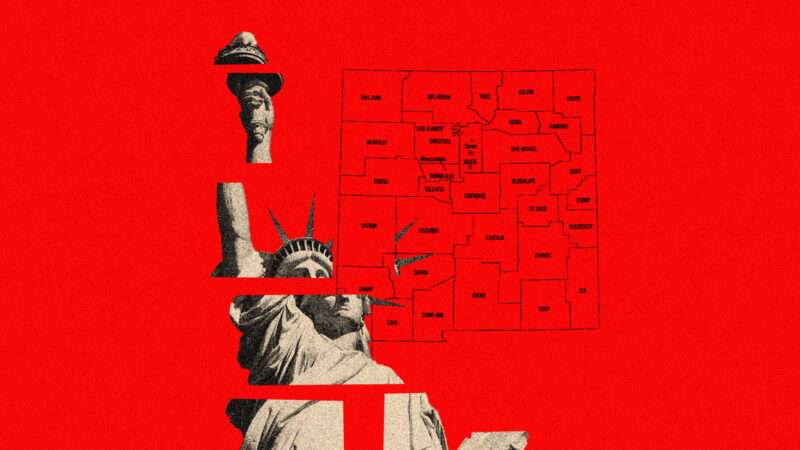Upon taking control of the Libertarian Party (L.P.) this May, leaders from the internal bloc known as the Mises Caucus quickly adopted “national divorce” as one of the retooled party’s core rallying cries on Twitter. New national Chair Angela McArdle proudly tweeted that she was “organizing the LP like an insurgency and preparing for counter insurgency operations.”
Over the past three weeks, minus the bloody violence part, the state Libertarian affiliates in New Mexico and Virginia have indeed divorced themselves from the party’s national leadership. But the Libertarian National Committee (LNC) is not letting them go peacefully without a fight.
On August 25, the Libertarian Party of New Mexico (LPNM), which achieved major-party ballot-access status in 2018 thanks to the 9 percent presidential showing in 2016 by former two-term Gov. Gary Johnson, announced that it was disaffiliating from the LNC.
“You have conspired, with a faction inimical to the principles of libertarianism, to impose upon us officers and governing documents foreign to our rules, unchosen by our members, and unacknowledged by the laws of our state,” state Chairman Chris Luchini wrote, in a long bill of particulars. “You have adopted messaging and communications hostile to the principles for which the Libertarian Party was founded, serving no purpose other than to antagonize and embarrass.”
At issue was an August 9 LNC letter declaring the New Mexico state party’s July 12 Constitutional Convention to be “null and void” due to “multiple” procedural violations, involving the proper advance notice and the manner of the convention (electronic). In a phone interview last week, Luchini theorized that the LNC’s real objection was to a bylaw change the LPNM made at that convention limiting the number of annual executive committee personnel changes to not more than two, thereby preventing the Mises Caucus (or any other bloc) from winning complete control of the state party in a single convention.
While Luchini granted procedural errors over advance notice, he said the LNC’s response was unduly and unreasonably punitive and harassing. “Violate a procedural rule, God forbid, commit heresy against Robert’s Rules of Order, they think us making a mistake justified any action on their part.” Rather than submit to national discipline, the LPNM chose secession.
No, we break up with you, the LNC responded in a meeting this past Sunday night. The National Committee refused to recognize the LPNM’s right to exit, and instead voted 14–1 (with two abstentions) to disaffiliate itself from the New Mexicans. But this divorce will come with a likely custody battle—over the name.
“If state parties choose to disaffiliate and operate completely independent of the national LP,” McArdle wrote to me this week, “they will need to come up with a new name.”
Luchini, for one, finds it ironic that the LNC is threatening to sue—use state force—to protect its trademark over the word Libertarian in a political-party context, especially considering that the LPNM had been in operation for decades before the LNC got around to trademarking the term in 2000.
The LNC anticipates that a new group of New Mexico Libertarians—the national party bylaws require just 10—will arise to form a new state-level L.P. in New Mexico that the LNC will then recognize as an official affiliate. According to a special rule of order passed at that same LNC meeting Sunday night, “The petitioners [for such a new party must have] held a public meeting which was open to all current national Party members and immediately previous affiliate Party members,” with reasonable notice.
That same day, the Virginia Libertarian Party’s state central committee (SCC) announced that it had dissolved itself after a 7–5 vote (with one abstention), complaining that “the national image of the party” was now “functionally indistinct from other alt-right parties and movements.” The party’s website and Facebook page disappeared; its email addresses stopped working.
The move was illegal, LNC Secretary Caryn Ann Harlos says, though the Virginia State Corporation Commission issued a letter Tuesday stating that the dissolution complies “with the requirements of law.” A parliamentarian consulted by the LNC countered that the dissolution required a vote of full party membership, while now-former Virginia L.P. chair Holly Ward believes that the SCC itself is the only relevant “members” who needed to approve. McArdle also said in a post to the LNC’s business listserv that “corporate dissolution papers do not make or break an affiliate and lots of affiliates don’t have corporate status.” Technically, in Virginia another legal step known as “termination” must also occur, after the Virginia party’s assets have been properly distributed.
Ward charged in a phone interview that the LNC has become a “fraud,” neither properly backing Libertarian candidates nor Libertarian messaging, in a state whose party achieved a remarkable 6.5 percent running Robert Sarvis for governor in 2013 (and another exceptional-for-Libertarians 2.4 percent running Sarvis for Senate in 2014). The national party has made the Libertarian banner toxic to potential candidates, Ward claimed, which she thinks helps explain why there are no L.P. candidates on Virginia ballots this year. In doing candidate outreach, Ward says, she found “interested parties declined to run based on the current image and narrative of the national party.”
Several local and regional Libertarian organizations in Virginia objected to the SCC’s abrupt self-destruction, and the conflict is ongoing: Disgruntled Virginia L.P. members are being asked to write letters of complaint to the state government (a move Ward considers a potential use of state force to achieve a political goal, and thus a Libertarian no-no) and the Libertarian Party of Northern Virginia has been decrying the move and vowing to “continue to work with affiliates across the Commonwealth to conduct the business of the party,” state party dissolution or not. There are various means for members to call for a new special convention and elect new officers who don’t want to dissolve, Harlos says, working on the presumption that the dissolution motion should be considered illegitimate.
“While the LNC has had to referee some internal party disputes recently,” McArdle wrote in her email, “we’re still focused on advancing the message of liberty, supporting candidates, and moving the needle in the direction of freedom. I appreciate how level-headed and calm the remaining LPVA officers have been and anticipate they will get their affiliate back in order quickly.”
Virginia and New Mexico are not the only states experiencing Libertarian turmoil. Massachusetts now has two functioning parties using the name Libertarian, only one of which is recognized by the LNC.
The Bay State fight emanated from a Mises-associated bloc of members from the state party calling for a (bylaw-legal) special convention in December 2021, that the old guard attempted to quash by in January 2022 expelling from the party all who called for it. Competing conventions were then held in April and the newer, Mises-oriented bloc is the one the LNC now recognizes as an affiliate.
Still, all the Libertarian candidates on the Massachusetts ballot this year are the ones put forward by the older body, now re-christened as the “Libertarian Association of Massachusetts.” Andrew Cordio, chair of the officially recognized “Libertarian Party of Massachusetts,” said in a phone interview this week that he’s currently more focused on membership and volunteer growth and outreach than candidates and ballot access.
In 2021, the Mises Caucus faction, then influential but not dominant on the LNC, was on the opposite side of a state-disaffiliation case, successfully blocking a move to break ties with a New Hampshire L.P. that was seen by the old guard as being too “toxic” for the national brand. (Roughly, some accuse the Mises side of hypocrisy, seeing the current New Mexico situation as analogous, except now the Mises crowd are for disaffiliating a state party that displeased them.) The attempted purge of LPNH, a party that has since attracted national attention for various inflammatory tweets, led directly in June 2021 to the resignation of then–national Chair Joseph Bishop-Henchman.
Harlos, consistently the LNC’s most meticulous stickler for proper parliamentary procedure, explains that the national party is duty-bound to protect the rights of members, sometimes over the actions of their governing bodies. If the LNC seems to be interfering with a state party, she says, it’s because “we have to determine who [the legitimate state affiliate] actually is,” which has to include “if they conducted themselves within their own bylaws.”
The LNC may be exerting a heavy hand of late in publicity and state affiliate management, but on the issues core to the functions of a political party—ballot access and candidates—the national party is largely irrelevant; the state parties do all the heavy lifting and have the legal relationships to their state’s electoral officials. The national party’s role is to occasionally offer financial, legal, promotional, and organizational support to either ballot access drives or (more rarely) candidates or candidate training.
The national party does pick a presidential ticket by majority delegate vote at its biannual convention in presidential election years, but every state affiliate has the legal power to ignore that choice and place its own preferred candidate. It almost never happens with any state party in happy affiliation with the LNC, but a rogue Arizona L.P. in 2000 did place science fiction writer L. Neil Smith on the presidential ballot in that state over national choice Harry Browne.
It seems overwhelmingly likely that whoever the Libertarian presidential nominee selected by the national convention delegates is in 2024, he or she will not be on the ballot in all 50 states, a threshold that the L.P. has achieved the past two presidential elections, and six times total in its 50-year history.
Despite these state conflicts, including assertions that current national policies are hurting the brand, according to its August financial report the national party’s number of active donors did begin rising after the May convention turnover in management, though as of August that number is lower than in any month in 2021 under the leadership displaced in Reno; August revenue is lower than the vast majority of months of the past year after a huge May rise that beat all but one month of the past year.
Luchini in an email this week said that there are plans to launch a new national organization of state Libertarian parties that do not wish to be affiliated with the current Mises-dominated LNC. While Luchini would not name any states specifically, he says he is confident from backchannel discussions that while New Mexico was “the first” to disaffiliate while still being recognized by the LNC, it certainly “won’t be the last.”
The post Libertarian Party Faces State Rebellions appeared first on Reason.com.
from Latest https://ift.tt/b09B4MG
via IFTTT








